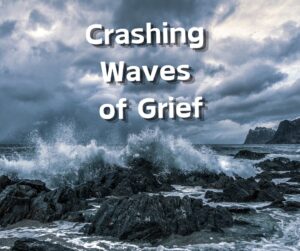Anger is stage two, according to the five stages of grief. Widows know that there are no stages but rather a flurry of emotions that occur all at once or independently and repeat randomly. Anger can be difficult to deal with. It can cause us to be snarky and rude or to isolate ourselves, which causes anger to grow. Each person processes anger differently, and, for me, it was exceedingly difficult when it reared its ugly head.
As a young girl, I couldn’t show anger. There was strict punishment for temper tantrums and voicing opinions. I learned to hold things in to keep the peace. I continued to do this throughout my life, at work and in my relationships. However, anger has a way of leaking out causing me to feel out of control so I try to keep it in check.
When a reckless driver killed my husband, I was in shock and experienced intense anguish, followed by sadness and depression. Throughout the first few months, I experienced an array of emotions, not in the order of the five stages and anger was not one of them. For me, anger didn’t belong; I saw it as a sign of weakness.
But then it happened. Just like the unpredictability of waves and how they can come in softly and other times come in crashing, engulfing the shoreline, anger overwhelmed me. My first reaction was to be angry with God. Next my anger was with myself, which included magical thinking, and how I could have done something to change the outcome. Eventually, I directed my anger toward the driver who killed Monty.
God was a primary target for my anger. If there were miracles, where was mine? Monty was a wonderful man and he didn’t deserve to die this way. This would not have been a huge miracle, just a delay in time. Monty was walking across the street in front of where we worked when a reckless driver ran a red light. Just like that, he was gone. But did this have to happen? Couldn’t God have somehow delayed Monty by a chance encounter with a friend or an untied shoe that would have caused him to stop and not be on that corner at that precise time?
Was there something that I could’ve done? Magical thinking is the belief that one’s actions could impact the world, or in my case, change the outcome of Monty’s death. These statements begin with “If only.”
If only I hugged him for two more minutes, he wouldn’t have been at that crosswalk.
If only I made him wait for me.
If only I asked him to sit down for breakfast before he left.
If only, if only, if only . . .
So began the blame game between everything being God’s fault or everything being my fault. Grappling with God, through prayer, journaling, and reading, I came to believe that he didn’t cause this. Instead, God was right there with me. He felt my pain, wept with me, and was preparing a new future for me. I understand there are people who don’t believe in God but my belief is comforting.
After I stopped blaming God, I had to stop blaming myself. That was the difficult part. The what-if’s are immensely powerful. It was my attempt to apply logic to something that was completely illogical. Realistically, there was nothing I could have done to have changed what happened. In my case, there is someone I can blame—the reckless driver. He, alone, is responsible.
Even with these realizations, I still have outbursts of anger, but I allow it. It is no longer a weakness. I work through it by doing something physical which is either working in the yard or exercising. Meditation and journaling are other techniques I use. These activities include me yelling in the air and crying but it leaves me more relaxed. Tears from grief release endorphins which are feel-good chemicals that ease emotional pain. Holding in anger was a ticking time bomb. Acknowledging and allowing it has helped me on my grief journey.
Currently, I’m between calm water and a rocky shoreline with crashing waves. There are times when I’m peaceful and feel good. I can think of the future and know I can make it. There are other times when the pain comes crashing in and the anger returns along with an array of emotions. I breathe and continue forward, knowing that every step I take is important.


